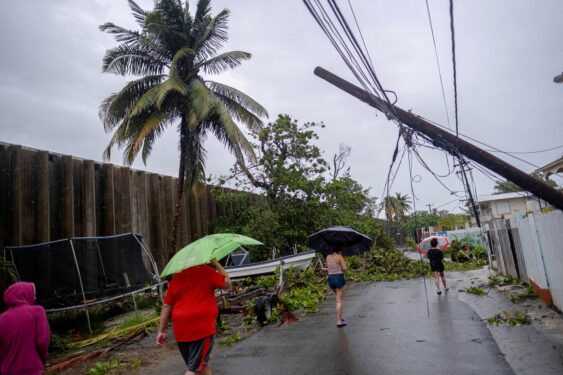
By John Lavenburg, National Correspondent
PROSPECT HEIGHTS — Watching the news and looking outside while sheltering at his parents’ home in Guaynabo, Puerto Rico, Father Enrique Camacho can’t fathom how almost five years to the day of Hurricane Maria the island is once again devastated, this time courtesy of Hurricane Fiona.
“I can’t believe it,” Father Camacho, the executive director of Caritas Puerto Rico, told The Tablet. “It doesn’t stop.”
“If you had interviewed me after five years of Maria with no Hurricane Fiona, I would have said things were starting to be a little bit normal,” Father Camacho said. “Now we’re going to have to start again from zero.”
Hurricane Fiona brought winds up to 85 mph and more than 20 inches of rain to Puerto Rico on Sept. 18, knocking out water and power on the island. More rain continued on Sept. 19. More than 1,000 people were rescued as the storm flooded streets, caused mudslides, and destroyed infrastructure.
As of Sept. 20, there was one death reported in Puerto Rico from the hurricane — a man who was swept away by a flooded river. Another man burned to death after he tried to fill his generator with gasoline while it was running.
The storm has since moved out of Puerto Rico, and now, the same way the island did five years ago, it will begin to assess the damage and chart a path forward to recover and rebuild.
Father Camacho said he’s requested from parishes in Puerto Rico a report of everything that happened in their communities so he and his team can understand what’s needed and what were the most affected areas. He’s been in communication with both Catholic Charities USA, which is working to send solar lights down that can be distributed into communities, and the Christian ministry, Food for the Poor, as well.
At the same time, Father Camacho and the Caritas team are organizing a logistics committee to make sure that the response is organized — fundraising, organizing and distributing donations, etc. He noted that the first stage of the disaster response is short-term aid to help with food, water, and other immediate needs.
Kim Burgo, the Catholic Charities USA vice president of disaster operations, told The Tablet that the organization plans to help however possible, adding that the “biggest and easiest thing” for people in the U.S. to do is donate funds to Catholic Charities or Caritas that will go directly to the island.
Catholic Extension will also be fundraising and responding to the immediate needs in the aftermath of Hurricane Fiona. Joe Boland, the organization’s vice president of mission, explained to The Tablet, however, that they’ll keep a focus on long-term recovery, which they’ve focused on since Hurricane Maria.
Specifically, they will rebuild Catholic churches and institutions to be more resilient.
“Hurricane Fiona only really highlights the urgency and the necessity of that work to help build up a more resilient Puerto Rican Church, because it’s in moments like these that the Church is the leading institution that steps up to shelter, to serve, to comfort, to feed the poor and the vulnerable who are usually the most impacted,” Boland said. “We believe that if we can build up these institutions and strengthen them, the church will have even greater capacity in future disasters to be able to help people.”
To date, FEMA has approved $95 million in funds since Maria for Catholic Extension to repair Catholic facilities that were damaged by natural disasters, and an additional $50 million has been approved for “mitigation measures” to build more resilient church structures to withstand future storms.
Eric LeCompte, the executive director of Jubilee USA Network, told The Tablet in August that Puerto Rico needed an additional $50 billion in disaster recovery aid, and an acceleration of the disbursement of the $55 billion in disaster recovery aid that Congress has already allocated for recovery efforts related to Hurricanes Maria and Irma, cautioning how bad things could get if it experienced another disaster.
He renewed that call Sept. 20, saying in a statement that “Puerto Rico will need more aid to address the damages from Hurricane Fiona, the island’s child poverty crisis and recovery from previous disasters.”
From the perspective of Caritas, Father Camacho said once the immediate needs are met the focus will shift to help “more holistically and integrally” by making case management clinics, and psychologists, doctors, nurses, and lawyers available to those who were affected.
“Then, the other step, the one that we were sadly still in with Hurricane Maria, now is going to be intertwined, is the process of getting us as we were or better than we were before the disaster,” he added. “That means we’re working with the reconstruction of homes.”
Father Camacho highlighted that his two biggest concerns moving forward are that people will leave Puerto Rico for the mainland the way they did after Hurricane Maria, which he said would be “catastrophic” for the island as it already suffers from people leaving, especially professionals and young people.
The other concern is the psychological situation of people in Puerto Rico after hurricanes Irma and Maria, constant earthquakes through 2020, the COVID-19 pandemic that the island is still working its way out of, not to mention a fragile electric grid that is prone to failing.
“People are really traumatized, and this is going to get more people traumatized,” Father Camacho said.
Burgo was in Puerto Rico after Hurricane Maria and saw the effort that went into erecting a temporary bridge over the Guaonica River in Utuado to connect devastated neighborhoods in the area. The other day she watched on the news as it was swept away in the flood waters.
“It’s like you’ve taken 10 steps forward and 15 steps back. You’re starting all over again,” Burgo said.
“I can’t imagine what they’re going through. Our prayers are definitely with them and we encourage others to do the same. They really need our prayers.

